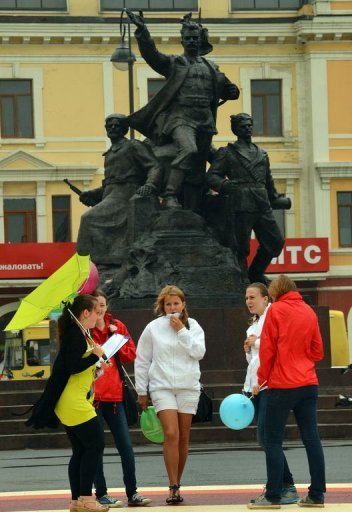Vladivostok, Russia (AFP) – Russia, which hosts its first annual Asia-Pacific Economic Cooperation summit this week, is seeking to assert its presence in the fast-growing region during troubled European economic times.
President Vladimir Putin championed hosting the summit not in Moscow or Saint Petersburg but in the Far Eastern port city of Vladivostok, in what the Kremlin hopes will be a symbol of Russia’s status as a major Pacific power.
Key members of APEC include China — with whom Moscow has had historically tricky relations — and Japan which is embroiled in a bitter territorial dispute with Russia. But the Kremlin is hoping for major economic gains by playing a bigger regional role.
“Russia’s share in total regional (Asia-Pacific) trade is around one percent. Clearly this neither corresponds to Russia’s political profile nor its economic interests,” said Gennady Ovechko, Russia’s envoy to APEC.
The potential is huge — Russia is looking to diversify its exports of natural resources at a time when the expanding Asian economies are hungry for oil and gas imports.
Russia has long looked on Europe as its main foreign commercial partner and turned its back on Asia, considering players like China to be a threat and expressing concern about Asian labour migration to its de-populating Far East.
But the woes afflicting the eurozone appear to have made Russia rethink its stance and realise that a rebalancing towards the east was indispensable.
From now on, “the rhythm of economic growth in Russia will depend on that of APEC,” Russian Finance Minister Anton Silunaov said last week ahead of the APEC leaders’ summit on September 8-9.
In a sign of the summit’s importance, Russia has pulled out all the stops to host the event, investing $20 billion and building two bridges spanning the port, an airport terminal and a new airport railink.
“Russia will try and use the chance of the Asia-Pacific Cooperation forum summit to change its image and appear not only as a European country but as an Asia-Pacific state,” said VasilyMikheyev of the Institute for the World Economy and International Relations (IMEMO).
Russia is hosting the summit in newly-built facilities on Russki Island just off Vladivostok after a massively ambitious project that troubled some officials who would have preferred to see the event hosted in more developed Russian cities.
But “holding the summit in Vladivostok is a symbolic choice,” said Dmitry Trenin of the Carnegie Moscow Centre.
“It’s a sign not just of a desire to increase the quality of life on Russia’s eastern borders but also a desire to consider its eastern territory as an interface between Asia, the Pacific and Russia.”
According to the Vedomosti daily, the cost of hosting the summit itself has now risen to 6.3 billion rubles ($194 million), with 275 million rubles ($8.5 million) being spent on a gigantic summit fireworks display alone.
According to VladislavInozemtsev, director of the Centre for Post-Industrial Society Research, the ambitious logistics displayed are the most that Russia will be able to offer its partners at the summit.
Writing in the Ogonyek weekly, he noted that in the last decade, no APEC summit had taken place on specially-built premises or has cost more than $100 million.
But, he added, Russia must also show the qualities of transparency, industrial modernisation and global cooperation that characterised Asian growth.
“To try to return Russia to the status of a great Pacific power, we need a widescale project of new development of Siberia and the Far East,” he said.
Russia’s economy still holds few attractions beyond energy resources and its Far East is also battling to reverse a population drain of people who have headed to the west of the country in search of better lives.
But Putin has now created a new ministry dedicated to the Far East and the Kremlin appears intent of turning Vladivostok from a ramshackle port into a showpiece political capital.



